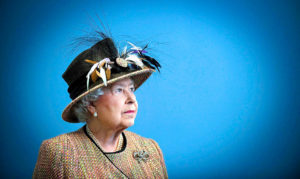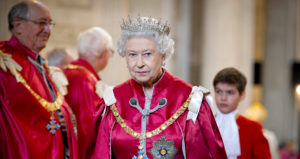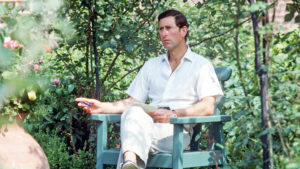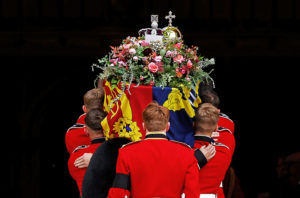Melancholic Autumnal splendour was soon overtaken by the instant decay of a new administration. But lest we should have forgotten the Queen’s funeral and the new royal accession, King Charles has now twice reminded us that the Spring of his new beginning is still intact.
First, an appropriate Spring date for his early coronation has been announced. And then, on Wednesday, he perhaps deliberately broadcast to the world his irritation and dismay at Truss: “Back again? Dear, oh dear. Anyway…” This incident has already exploded any notion that Charles as King will be completely apolitical. But a more political monarchy should be welcomed, both in principle and also on account of the immediate and complex danger in which our realm now stands.
In the face of this peril, King and Prime Minister represent two completely opposite possible future responses: one concerned with restoring a more natural, rooted, cooperative order under the authority of a mystical deity; the other determined to install a yet more nakedly liberal and secular regime in which order is to be distilled out of the uprooted strivings of human individuals who seek only their own further advantage.
Thanks to both new global circumstances and to Truss’s overkill, we can no longer be so sure of the inevitable triumph of the second, more obviously modern perspective as we once might have been. We can now recall that the Queen’s funeral was the sudden and gently confident rising to the surface of an older and deeper reality. What drew people to this event was a phenomenon of incarnation, in an ultimately Christian sense, which nonetheless resonated for people of many different faiths and none at all. The Queen, in her increasingly frail body, had been the ultimate locus of power and authority. She stood for the notion that legitimate power, in contrast to the Trusketeer vision, is, indeed, inherently symbolic as well as personal, because it derives from above and from our answerability to the eternally and objective Good, True and Beautiful, not from a balancing of brutally material forces.
England was once devoted to the notion of the “king’s two bodies” — the idea that when the mortal body of a monarch dies, her immortal body of authority survives. (Charles became king not through a ceremony, but at the very instant of his mother’s passing away.) This idea was ultimately inseparable from a theological one: the doctrine that Christ was, in a still more radical sense, at once both human and divine.
Yet in the case of kingship, this never meant that the monarch was a pagan semi-deity. Rather, kingship is anointed: the king is only king under God, and bound to the divinely-given law of the land and to the people who themselves belong to God. The scriptures recognise both the dangers of monarchic tyranny and the likelihood, in a republic, of aristocratic corruption. It is for this reason that they advocate what is in effect a mode of constitutional monarchy.
We speak of ourselves too often as a mere “democracy”, as if we believe in the dominance of the sheerly aggregated will of the British people. But in reality, we live in a representative democracy, under the ultimate sway of the Crown. Political representatives are in effect a kind of “aristocracy”, since they at once guide, influence and interpret the will of the people.
It can seem as if the way forward should be further to liberalise and democratise that mixture. But do we wish to unleash the isolated wills of narcissistic individuals — or their aggregated compound, often in populist reaction against the former? In reality, a less hollow, more participatory and continuous democracy can only prevail if we cultivate a more honourable and rooted leadership at every level, rather than a self-seeking oligarchy that seeks to manipulate and control the populace as though it were a machine.
Monarchy might stand at the apex of this better “aristocracy”. Its leadership is inherited, tying it to tradition, to land, to the interpersonal and to patronage. It is naturally linked to the rural soil, to the encouraging of creative labour, and to life, as instanced by the causes that Charles III supported when he was a prince.
However, mixed government supposes a perennial sense (well known to Charles as a reader of René Guenon) that human beings tend either to be thinkers, doers or sustainers — therefore to fall into contemplative, political-military or economic social roles. A monarch is naturally drawn towards the top-down integration of these three elements, just as he tends to see the need to link the executive, judicial and democratic powers within the political sphere.
Therefore, the monarch not only enables but also counterbalances the aristocrats. His power resists their latent republican desires for purely oligarchic rule; indeed, it often depends upon a “Caesarian” appeal, over their heads, to the people, as we see in Shakespeare’s tragedy, Julius Caesar. The monarch can act as a counterweight to the over-confidence of the supposedly wise, whose wisdom has degenerated into mere expertise. A king is properly concerned with the inculcation of genuine wisdom and often this resonates much more with the common-sense and folk traditions of the people than the bourgeois theorising of the semi-educated.
For this reason, there is nothing inappropriate about King Charles’s specific interest in a better pedagogy. Ultimately, a non-liberal politics exists to inculcate virtue in its citizens. Charles has often promoted exactly that, through his various trusts and projects. But at the same time, he has also attended to the popular voice with respect to architecture, family, community, land, craft and local economy. Experts have tended to deride this work, ignoring the fact that monarchy can help to render democracy more substantive, as opposed to allowing it to become increasingly hollowed-out by attention to only formal procedures.
Everything here is paradoxical: if more power is to spring from below, it needs a space shaped, crafted and protected from above. Only a king may possess a destiny sufficiently at one with his people to be relatively immune to selfish distractions and partisan influences.
That is why monarchy is never apolitical or merely “dignified” and ceremonial — but is, rather, political in a sense higher than is usually observed in our agonistic politics. Deeper than our arguments lies always our consensus, without which the arguments could not be peaceably conducted. Kings and Queens can legitimately attend to the shaping and promotion of this consensus, even though it will never, of course, be without some contestation.
Charles as Prince was right to focus on matters of land, life, labour and education. He was right also to focus on trying to include the socially marginalised. All this is about the pursuit of the common good, and should not be controversial, or thought of as “meddling”. A Trusketeer politics that ignores the common good is not a politics at all, but an anti-politics. It is a monarch’s higher priorities that may serve to preserve the Union of four distinct peoples and a shared feeling of “Britishness”, despite an increase in federalised self-government.
We need to understand that our institutions are all in disarray because we do not understand the real principles of mixed constitution which they embody, nor their ultimate links to sacral monarchy. For it is impossible to pursue a shared Good, Truth and Beauty if one has no conviction that these things are eternally real — and can, to a degree, be rendered truly incarnate and instantiated as “harmony” here below. Congregations in churches and Hindu temples may be inspired by the priestly promise of the celestial, but the people in the queue were even more inspired by the notion that heaven might be brought down to Earth — and the hope that, one day, the Earth itself would be restored, when only “God”, or the Truth itself, is finally our ruler.
Monarchy is subordinate to a spiritual priesthood — to us, the established church, which now guards the orb and sceptre until coronation day — and yet looks carnally beyond it, to a greater integration of soul with body and of understanding with pleasure. This is why everyone was so awed and yet excited by the funeral.
But how can we renew our constitution today? Monarchy should be a key part of that renewal: it has an especially strong role to play now that elected leaders are so distrusted. Without a monarchic tempering, populism may well deliver ever-further extremism, and liberalism may deliver ever-further intolerance of those who uphold objective norms. Our hope must lie in Charles exercising the higher and more fundamental politics proper to a king.
He could make more of his views public, where crucial aspects of our civic life are under threat. He could reduce his household, but increase his assembly of advisers and their interactions with the Civil Service. He could meet more regularly and not just ceremonially with members of his Privy Council. He could increase his influence with the House of Lords. He could consider the exercise of the royal veto in relation to matters that obviously violate the verdict of the ages or fundamental human liberties. In the future, the Crown might also move to prevent gross violations of our constitution, such as Blair’s removal of the House of Lords’s role as our highest court, or Johnson’s prorogation of Parliament.
Above all, Charles could expand the role of Royal commissions, colleges and trusts. On the model of the National Trust, he could establish organisations operating under royal charter concerned with ecology, land use, water, energy resources, housing, education and so forth. They would both produce strong ideas and put them into practice, on land that the organisations themselves owned.
None of these measures would damage representative democracy, because elected assemblies would still generally have the last word. But by increasing and encouraging honourable virtue and wisdom — drawing at once on ancient traditions and popular instinct — Charles’s reign could truly enable more popular involvement in social and economic processes.
God is said in the New Testament to have “emptied himself” by becoming a man on Earth. Instinctively, the people of this country recently responded to the self-emptying character of royal power. They saw that the monarch is us — her body our body, her death our death — and yet, miraculously, she is not dead, not even in her fragile earthly body, which is re-embodied in Charles. They saw that real power is obedience to the Good and service to the people. They saw that they can only be people themselves if they pursue these kingly virtues and become a “royal priesthood”. It is this vision that we must now seek to realise if we are to save ourselves as a polity.
Disclaimer
Some of the posts we share are controversial and we do not necessarily agree with them in the whole extend. Sometimes we agree with the content or part of it but we do not agree with the narration or language. Nevertheless we find them somehow interesting, valuable and/or informative or we share them, because we strongly believe in freedom of speech, free press and journalism. We strongly encourage you to have a critical approach to all the content, do your own research and analysis to build your own opinion.
We would be glad to have your feedback.
Source: UnHerd Read the original article here: https://unherd.com/





